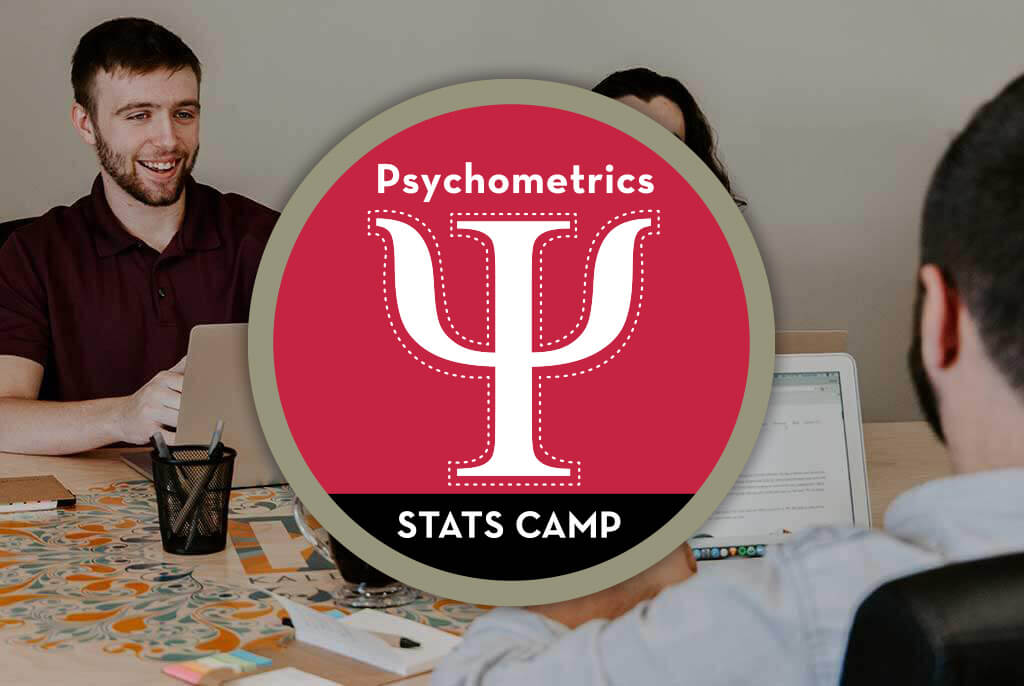IN PERSON – 5-day Statistics Short Course
Seminar Overview:
We’re all looking to measure something, but we first need to understand what how that measurement process works! Psychometrics is the underlying science behind all of your tests and measurements used to evaluate psychological attributes, whether those are ability, aptitude, achievement, attitudes, interests, personality, cognitive functioning, and mental health. This course will introduce you to the measurement and statistical concepts that are central to psychometrics, as well as the psychometric fundamentals of factor analysis and Item Response Theory.
Seminar Topics:
- Measurement and statistical concepts specific to psychometrics
- The latent variable modeling perspective
- Reliability – classical and modern approaches
- Validity – conceptual and statistical aspects
- Factor analysis – exploratory and confirmatory
- Instrument development & validation process
- Measurement bias & strategies to address bias (e.g., MIMIC models)
- Multi-group analyses & measurement invariance testing
- Missing data
- Item Response Theory: 1PL (Rasch) & 2PL & 3PL models
- How to use MPlus for psychometric analyses
Seminar Description:
Psychometrics is the science of how we measure things, such as the psychological attributes of people. These psychological attributes include abilities, aptitudes, achievement, attitudes, interests, personality traits, cognitive functioning, and mental health. Psychometrics, theoretically-informed and precise measurement, is an essential component of many of the things we hold dear. Scientific advances (e.g., can I make a claim that I am measuring what I purport to measure?), educational placement decisions (e.g., should a child be placed into a gifted program?), statistical power (e.g., is my measure precise enough to suggest that X predicts Y?), and other key considerations are all affected by psychometrics. This seminar emphasizes the conceptual understanding of and the application of psychometric principles.
Instructor: Larry Price, Ph.D.
Larry Price, Ph.d. is a Professor of Psychometrics & Statistics and was previously Director of the Office of Data Analytics & Methodology at Texas State University for 13 years. Between 1999 and 2002, Dr. Price was employed at The Psychological Corporation in San Antonio as a Senior Psychometrician/Statistician where his work focused on improving the psychometric properties of the Wechsler Scales of Intelligence Memory (e.g., WISC-III, WISC-IV, WAIS-III, WMS-III, and WPPSI-III), and Achievement (WIAT-II) and other psychological measures such as the Beck Depression Inventory (BDI) and Clinical Evaluation of Language Fundamentals (CELF-IV). His research interests include the theoretical development and testing of Bayesian and non-Bayesian psychometric models in psychological and neuropsychological research (neuroimaging network analysis), theoretical development, testing, and refinement of classical and modern psychometric methods in the behavioral sciences, development of dynamic multivariate time series models for the psychological, social and neurosciences. Before working at Psychological Corporation, he worked at Emory University from 1986 to 1999 as a Biostatistician and Psychometrician in the School of Medicine. Funding mechanisms for Dr. Price’s work include NIH, NSF, DOE, and private organizations.
APA Continuing Education Credits:
This course offers 24 hours of Continuing Education Credits. Stats Camp Foundation is approved by the American Psychological Association to sponsor continuing education for psychologists. Stats Camp Foundation maintains responsibility for this program and its content.
Seminar Includes:
Materials, downloads, recorded course video viewable for up to one year.




